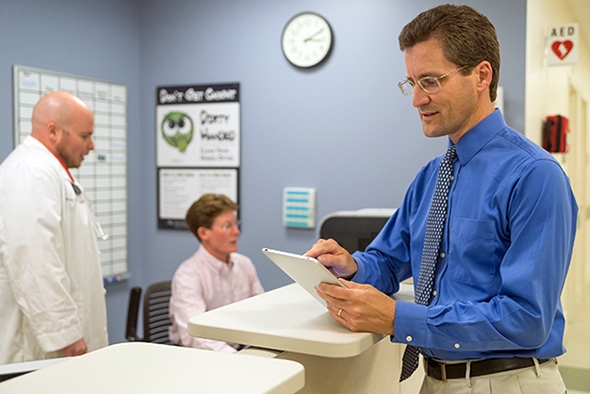Dartmouth has been awarded a $10-million, five-year grant from the Secure and Trustworthy Cyberspace program of the National Science Foundation (NSF) to support research into ways of safeguarding the confidentiality of personal health and medical information as these records make the transition from paper files to electronic systems.
David Kotz, Dartmouth’s associate dean of the faculty for the sciences and the Champion International Professor in the Department of Computer Science, will lead an interdisciplinary and multi-institution project team which includes experts in computer science, business, behavioral health, health policy, and health care information technology.

Dartmouth computer scientist David Kotz leads a team that will conduct research in the secure use of mobile and cloud technology for health and wellness applications. (Photo by Eli Burakian ’00)
“This project tackles many of the fundamental computer science research challenges to providing trustworthy information systems for health and wellness, as sensitive information and health-related tasks are increasingly pushed into mobile devices and cloud-based services,” Kotz says.
Moving medical information into cyberspace is part of an effort to reduce costs, increase efficiency, broaden access to health care, and improve the health of the U.S. population overall. This initiative will facilitate communication between physicians, clinics, hospitals, and other health care providers.
The federal government is leading the charge, stating on its official website for health information technology, “Health information technology makes it possible for health care providers to better manage patient care through secure use and sharing of health information.”
The Dartmouth-led project is entitled Trustworthy Health and Wellness (THaW.org) and is part of the College’s Institute for Security, Technology, and Society (ISTS) research initiative on information systems and health care.
“When ISTS was formed at Dartmouth over a decade ago, we believed that focusing on interdisciplinary research in computer security and privacy would advance the science of security,” says Martin Wybourne, interim provost and vice provost for research at Dartmouth. “This award confirms Dartmouth’s leadership and exceptional scholarship in this area.”
Lisa Marsch, head of the Center for Technology and Behavioral Health at Dartmouth’sGeisel School of Medicine, and Eric Johnson, until recently a professor at Dartmouth’sTuck School of Business, are co-principal investigators. Johnson has just moved to Vanderbilt University as dean of the Owen Graduate School of Management, but he will continue as a collaborator on this project. The project team includes researchers from Dartmouth, Johns Hopkins, the University of Illinois, and the University of Michigan.
The THaW team will conduct research in many areas related to the use of mobile and cloud technology for health and wellness applications, including authentication and privacy tools to protect the information in health records, methods to secure small-scale clinical networks, and methods to detect malware in medical devices.
In the long run, the THaW project will help create secure health care information systems that enable individual citizens to protect their privacy and allow health professionals to ensure data integrity and security. The team is also training the next generation of computer scientists by creating courses and sponsoring summer programs for undergraduate and K-12 students and by developing an exchange program for its postdoctoral fellows and research students.
For more information, visit the project website at THaW.org.
